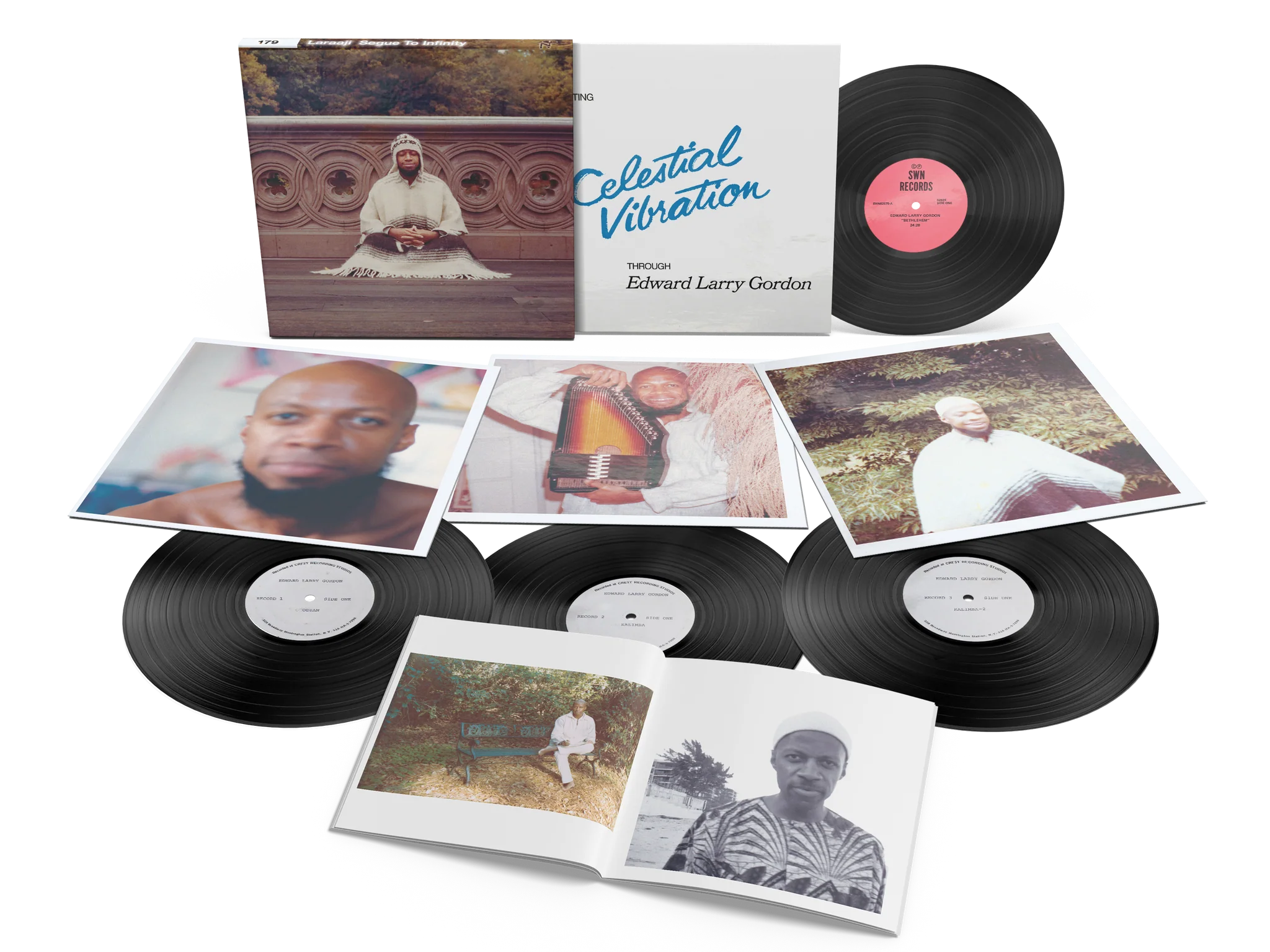Three Hours of Hypnotic Bliss: Laraaji’s ‘Segue To Infinity’
Numero’s 4LP box set collects the zither master’s early recordings
With its connotations of washed-up hippies, dubious alternative wellness practices, and spas, “new age” was once the most insulting descriptor. Yet new age music, presented to older generations through radio shows and unassuming (or aesthetically off-putting) CD and tape compilations, has seen a revival over the past few years. Collectors and reissue labels have plucked out the good stuff and contextualized it in the broader history of ambient music, while various internet algorithms beam it to listeners worldwide.
Probably the biggest resurgence has been that of Laraaji, the zither master who’s worked with Brian Eno, Haruomi Hosono, and Bill Laswell, and who also leads laughter meditation workshops. In the pre-internet era, he released most of his work on small labels with little distribution, or as cassettes (and later, CDs) that he’d sell while busking in New York. As his work becomes ambient canon, Numero Group presents Segue To Infinity, a recently released 4LP box set encompassing his first LP, 1978’s Celestial Vibration, and three discs of recently discovered recordings from the same time.
Before he became Laraaji, Edward Larry ‘Flash’ Gordon was a stand-up comedian and actor, who later played piano and Fender Rhodes in various groups and picked up guitar for its portability. One day, he intended to pawn his guitar for rent money, but instead traded it for an autoharp, from which he removed the chord bars, altered it a manner similar to John Cage’s prepared piano, attached a pickup, and ran it through phase pedals into a Fender Twin amplifier. He often busked at the northeast corner of Washington Square Park and played at dance companies and spiritual programs around the city. After one performance at a holistic center in Midtown, a middle-aged lawyer named Stuart White was so entranced by Gordon’s playing that he launched a label, SWN Records (pronounced “swan”), to record and release Gordon’s first album, Celestial Vibration Through Edward Larry Gordon.
Celestial Vibration, comprised of two side-long pieces and released before Ed Gordon became Laraaji, is truly magical though with such limited distribution didn’t go anywhere. Gordon was raised in the Second Baptist church before pursuing Eastern spirituality, though you don’t need to be spiritual or religious to appreciate it. “Bethlehem” on side 1 gets off to a shaky start, but give it a few minutes and Gordon’s layers of sweeping zither and low-frequency background pulses will wash over you. Side 2’s “All Pervading” highlights the instrument’s percussive qualities and induces a hypnotic state of bliss.
That hypnotic bliss continues for the other three LPs that round out the Segue To Infinity box set. Sourced from a box of acetates that Jake Fischer bought on eBay for $114 as a broke college student in 2021, these six side-long pieces from the Celestial Vibration period are equally worthwhile. You could listen to these discs one at a time, but it’s easy to listen to the entire three-hour set in one sitting. “Ocean” predictably flows in waves, while the set’s title track features the mystical flute of Richard Cooper, the only time that there’s another musician present. Gordon also plays one piece on koto and three on kalimba. “Koto” is more metallic and discordant with some cool delay effects, while the three kalimba pieces (“Kalimba,” “Kalimba 2,” and “Kalimba 4”—maybe “Kalimba 3” is lost to time or never existed to begin with) all center around the same melody played in soft, spellbinding patterns with comparatively minimal production. And with that, Edward Larry Gordon was officially on his way to becoming Laraaji.
One day a year later, he played his zither in Washington Square Park as usual, closed his eyes, and opened them hours later to find a note from Brian Eno. Eno, impressed, recruited Laraaji for 1980’s Ambient 3: Day Of Radiance (but not without sticking “PRODUCED BY BRIAN ENO” on the front cover), the next step in the long, eccentric, fascinating story of Laraaji Venus Nadabrahmananda.
An anonymous cutting engineer at GZ Media cut the vinyl box from digital files restored and remastered by Michael Graves. The sound isn’t perfect, but considering the sources it’s immersive enough to serve the music. The box was pressed at either GZ or their Canadian partner Precision; GZ and Precision codes appear in the runouts, so either Precision pressed the records from GZ cuts or merely acted as a broker for a GZ pressing. The standard black vinyl edition is a bit noisier than I’d like. Maybe the “All Pervading” multicolor vinyl is quieter, though I’ll listen to the 44.1kHz/24bit Apple Music stream if I want dead quiet (surprisingly, there’s no CD edition).
As with most Numero reissues, the packaging and liner notes alone are worth at least half the cost. The four records each come in tip-on jackets within a high-quality slipcase, accompanied by a 16-page booklet with photos and incredibly useful and insightful essays by Vernon Reid and new age expert Douglas Mcgowan. (My box set arrived with seam splits on all of the jackets, but I won’t be one of those assholes who returns a generally fine set of records over seam splits. It’s incredibly wasteful.) If you’re at all into ambient music, this excellent, lovingly produced box set is worth the money.









































.png)








